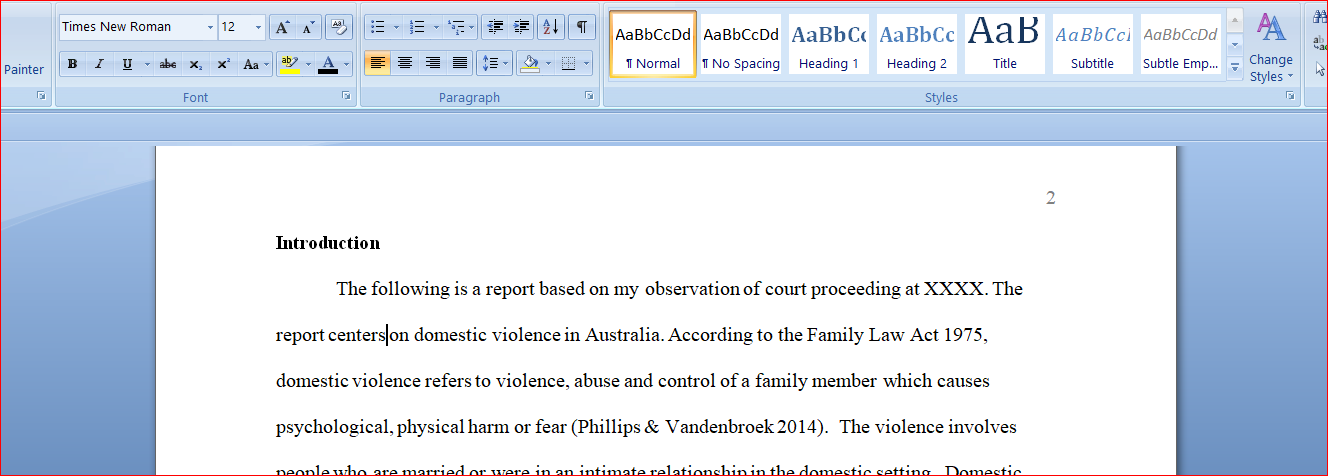Identify an issue which relates to Human Service practice
COURT REPORT INSTRUCTIONS
This assessment requires you to:
1) Attend the Local Court,
2) Observe proceedings,
3) Identify an issue which relates to Human Service practice
4) Research the issue
5) Write a report contextualising the issue which you have identified with the Essential Readings and material you have
researched
FAQ- What is ‘an issue which relates to Human services practice’?
Think about it – many clients have multiple issues apart from their legal problem. e.g. mental health, drug and alcohol, domestic violence, gambling, issues relating to CALD communities, issues relating to indigenous clients, disability, intellectual disability, …… and so on…….
You can also write about systemic issues (ie issues which relate to the system as a whole – use of interpreters, self- represented litigants, access to justice for disadvantaged groups, different sentences and penalties and their impact, initiatives like domestic violence court support or restorative justice, role of victim and victim support, bail programmes like MERIT, use of health personnel in court etc.
2
Step 1 – Before you attend the Local Court Prior to attending court you should familiarise yourself with court proceedings by:
(a)Watching at least one episode of “Court Justice Sydney” (b)
(b)Looking up the Local Court website and finding court lists to ensure you know which matters are criminal and which are not
(c)Week 5 Criminal Law gives you information about court processes and sentencing
(d) Reading the Essential and Additional References
(e) Attending Workshops- each one will spend time on court report preparation
Step 2 – Attend the Local Court
(a)There are Local Courts in many areas of Sydney Larger court complexes like the Downing Centre, Parramatta, Campbelltown and Penrith will have a number of Local Courts sitting at the same time. This enables you to move to another court if you do not see anything which can form the basis of the report.
(b) You should treat this visit as if you are a social science researcher. Take notes, watch and listen to everything you can
Remember to follow the etiquette of the court and be sensitive to people’s privacy. At the same time, you need to
listen carefully to pick up on what is going on. If you anyone you know is appearing, leave immediately to
preserve their privacy
(c) Fill out the Court Report Questionnaire- either at court or later with the information you have collected.
If you have absolutely no idea about the legal system you may have to visit more than once. Make sure you leave enough time to do this.
3
Step 3- Identify an issue
(a)The Essential and Additional Readings raise questions about the way the Local Court deals with the matters before it. You must refer to the essential references and relate your court experience to the issues raised.
(b) You must also write about something you saw in court, research it and integrate with the Essential Readings.
It must be a human services related issue ie not a technical legal issue.
(c) There is a great deal of overlap between legal and socio- legal issues, for example, “intoxication” is a legal issue but drug and alcohol use is a human services related issue. NB You do not have write about “cases”, focus on broader issues
raised in the cases you witness which have relevance to your future work in human services.
Step 4- Research your issue and integrate with Essential References
(a)There is no set number of references, as this is used as a marking criteria- whether you can identify and use appropriate
references to support your argument.
(b)You need to make an argument which uses the Essential
References and your independent research in a coherent and
convincing way
4. Remember the overall question “Was justice done”
(a)If you deal with this in one sentence at the end “yes/ no- justice
was /was not done” you have not answered the question
adequately.
(b) Keep this question in mind throughout your argument and
relate your findings to the question.
(c)The issue you choose should also have relevance to the overall
question
4
STRUCTURE OF THE REPORT
SECTION ONE: Court Report Questionnaire (200 words)
This will help you record basic details of what you have
observed in court.
Don’t worry about names of parties/defendants, in fact try to
anonymise any personal details of litigants/defendants.
Use the questionnaire to identify an issue/aspect of court
proceedings that you can research and write about.
Use the questionnaire to avoid repeating information in your
report
SECTION TWO: (2000 words)
Observe court proceedings
Evaluate the quality of justice delivered in relation to the
issue/problem you have identified
You can choose any aspect of court proceedings which you
have observed as the foundation for your report.
You can’t write about anything you haven't observed- i.e.
your observations MUST form the basis of your report
FORMAT (Report style, mandatory subheadings)
Introduction: 150 words
Briefly outline the aspect of court proceedings that you
have decided to focus on and why it is important.
Literature review: 200- 600 words
What questions and concerns about justice have been
raised?
Refer to essential readings and other theoretical
perspectives
You will need to independently research the
issue/problem etc that you have identified.
Observations and Evaluation: 1200 -1800 words
Present your observational data about the major findings that
5
can be derived from your court/tribunal visit – refer to your
questionnaire for details.
Keep your question/issue in mind when you are presenting
this data.
Evaluation: This is the most important part of the report and
should take up a minimum of 30% of this section
Interpret your data in relation to your question/issue/problem
What is the significance of your findings/observations?
How do they relate to the theoretical material?
Answer preview for identify an issue which relates to Human Service practice
Words:1969

